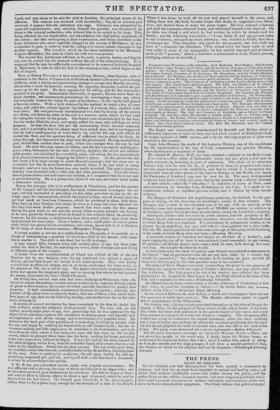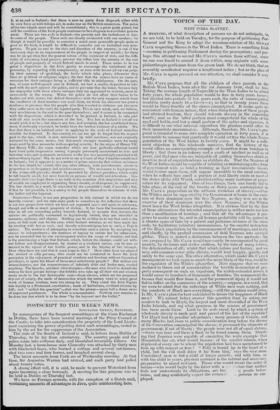THE PRESS.
STATE OF IRELAND.
GLOBE—Ireland, now that Emancipation has been carried, is restored to its ordinary, and what has at times been regarded its natural and healthy state ;—of which riots without intelligible cause—time rabble stoning time polmee, and the police firing on the rabble—frequent murder, and more frequent justifiable homi- cide—and a general prevalence of reckless turbulence and contempt of the taw, 'scorn to be the characteristic symptoms. We firmly believe that political danger is at an end in Ireland; that there is now no 'party there disposed, either with its own force or with foreign aid, to make war on the British connexion. The union of the two islands must and will be consolidated ; this is a great point gained, but still the condition of the Irish people continues to be a disgrace to a civilized govern- ment. There are two evils in Ireland—the poverty and the turbulence or law- lessness of the people. These evils are closely connected with one another: for though it would be possible to conceive a much more peaceable people quite as poor as the Irish, it would be difficult to conceive one so turbulent very pros- , perous. To put an end to the riots and disorders of the country, is one of the necessary steps to an improvement of the people in respect of wealth; for there can be no question that the general notion of the existence of riots, and the diffi- culty of executing legal process, prevent the influx into the country of the sort of people and property of .vhich Ireland stands in need. There seems to be too great a disposition in the Irish gentry to encourage the turbulence of the peasantry, by regarding with complacency, or even with favour (if we can judge by their manner of speaking), the broils which take place, whenever they have no political or religious origin ; the fact that the rioters have no cause or occasion for their outrages being a sufficient title to indulgence. On the part, too, of some well-disposed men in Ireland, we find a similar disposition to take part with the mob against the police, and to presume that the latter, because they are unpopular with those whose outrages they-are appointed to restrain, must be necessarily in the wrong. When the police do not allow their brains to be beaten out with stones, but defend themselves with the only weapons which from the smallness of their numbers can avail them, we think we discover too great a readiness to presume that the people who first resorted to violence are (because they suffer most in the end) the injured party. This is very weak, and, we believe, very mischieveus in the end to the poor themselves ; and it seems to be connected with the disposition, which is described to be general in Ireland, to take part with all who resist the execution of the law. The law in Ireland is not all we -would wish it to be ; but almost any law, and certainly the law established there, must, if uniformly executed, be better than the lawless violence of a rabble. We fear that there is an habitual error ia applying to the evils of Ireland remedies suitable for England. In this country we are too apt to forget that the respect paid to the law, which is now maintained by mild sanctions, was not originally enforced by the same means, but that much stronger remedies were for many years used by wise monarchs with unsparing severity. In the reigns of Henry VII. and Henry VIII., the same remedies which are now perfectly effectual would have been quite inoperative among a people previously accustomed to riots and intestine wars, and systematic resistance to the law was accordingly punished with extraordinary rigour. We do not wish to see a Court of Star Chamber established in Ireland ; but it appears to us a matter of prime necessity that .iolent resistance to the law should be visited, like any other offence, with punishments, severe in proportion to its frequency and mischievousness. The resistance to legal process, if the crime still prevails, should he punished by distinct penalties, which ought to fall heavily on all, but most heavily on persons of wealth and education. Sys- tematic riots (we hope there is no truth in the assertion that magistrates and men of wealth are employed in organizing them) should, at all expense, be suppressed. The law should, in a word, be executed by the constable's staff, if possible ; but, if that be not possible, it is a mercy to the people themselves to execute it with the bullet and the bayonet.
STANDARD—There is not one proposition in this extract in which we do not heartily concur ; and we take some pride to ourselves in the reflection that there is not one proposition which we have not repeated again and again in substance, though not with so much propriety of diction. It has been the fundamental mis- take in all our conceding policy towards Ireland, to assume that, because the nations arc politically connected or legislatively united, they are identified in manners, opinions, and objects. Nothing can be so false as to say that such is the case, or that such can be the case, while Ireland remains, as we have made her by treating with her as such, and thereby acknowledging her as such, a Popish . nation. The madness of attempting to conciliate such a nation by accepting her claims to independence ; the madness of hoping to satiate her by submission, can be exceeded but by one extravagance within the scope of insanity, and that is the entertaining a hope that Ireland, which, before the change, could not with- out failure and disappointment, be treated as a civilized nation, can be now so treated in the vigour of her hostile power, and in the heyday of her triumph. How often have we said that it must come to tins? How often have we adjured the wicked or silly persons, who could not be contented to leave the Irish peasantry in the enjoyment of practical comforts and freedom without theoretical privileges, to spare the blood of those most unfortunate people ? But neither our remonstrances, nor the remonstrances of infinitely abler and better men, availed anything. The Quacks, and their idiot disciples—the men who loved to disturb the waters for their private fishing—the fribbfes who take up all their wit and wisdom ready made in the last fashionable cant—these classes, which are the perpetual dry-rot of society, the seeds of destruction which the enemy sow i in every great work of human wisdom, were too strong for us. They voted the Irish Papists into loyalty to a Protestant constitution ; made of barbarians, civilized citizens by bill; and "settled the question"—that was the phrase—upon half a dozen skins of engrossed parchment. The whole is consummated. Nothing now remains to be done but that which is to be done "by the bayonet and the bullet."



















 Previous page
Previous page